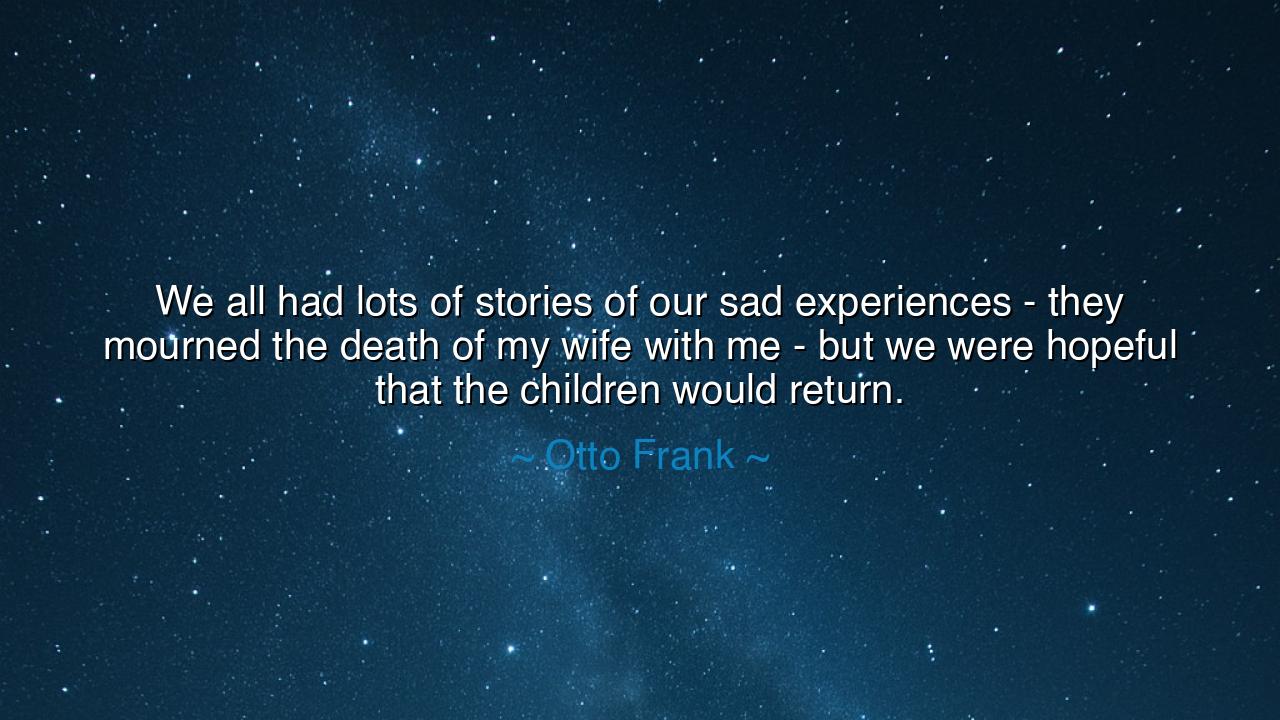
We all had lots of stories of our sad experiences - they mourned
We all had lots of stories of our sad experiences - they mourned the death of my wife with me - but we were hopeful that the children would return.






In the words of Otto Frank, the sole survivor of his family from the Holocaust, there echoes both the sorrow of loss and the fragile flame of hope: “We all had lots of stories of our sad experiences - they mourned the death of my wife with me - but we were hopeful that the children would return.” This statement was born in the aftermath of one of humanity’s darkest nights. It was spoken not as a grand speech, but as a quiet remembrance — the kind that trembles on the edge of grief and faith. Frank’s words carry the essence of a man standing in the ruins of his world, surrounded by those who shared his pain, yet still daring to believe that life might give back what war had stolen.
In these words lies the ancient rhythm of human endurance. Across the centuries, people have always gathered around the embers of tragedy, sharing stories that make suffering bearable. Frank and his companions were bound by shared loss — the same way villagers once gathered after a storm, recounting how the sea had taken their boats but not their spirit. Mourning together becomes a sacred act; it binds souls and gives meaning to pain. The death of his wife was not his alone to carry; others shared the burden, and together they formed a circle of remembrance where grief became a form of communion.
Yet, what makes the quote eternal is the second half — “but we were hopeful that the children would return.” Hope, fragile as a leaf in the wind, becomes the only rebellion left to the broken. Even in the face of annihilation, Otto Frank held to that thread — the dream that Anne and Margot might still walk through the door, laughing as before. It was not reason that fueled such hope, but love. For love, in its purest form, refuses to die even when the body perishes. It lingers in the heart like a stubborn light that no darkness can fully extinguish.
History has shown this spirit again and again. In the aftermath of Hiroshima, there were mothers who waited at the station every morning, believing their children would step off the train. After wars, earthquakes, or floods, the same story repeats — the human refusal to give up hope. And sometimes, that very hope becomes the force that rebuilds nations and souls. Otto Frank’s hope, though unfulfilled in life, became the seed of his daughter’s legacy. For through Anne Frank’s diary, the world would come to know their story, and millions would find courage in the words of a girl who still believed in goodness amidst evil.
In this way, Otto Frank’s sorrow transcended into universal meaning. His mourning was not the end but a bridge — connecting despair to remembrance, and remembrance to wisdom. His grief taught the world that hope does not need proof to exist; it thrives precisely when the mind says there is none. This is the paradox of the human heart: it can break and still beat. The ancients would have seen in his endurance the mark of a hero — not one who slays dragons, but one who survives them and keeps his compassion intact.
The lesson is clear: when the night grows longest, we must still guard the small fires within us. Tell your stories, even if they are filled with sorrow. Share your pain, for in doing so, you create a bond stronger than grief. But above all, do not surrender your hope. Let it be humble and quiet if it must, but let it live. For as Otto Frank’s life shows, hope is not about expecting miracles — it is about preserving humanity when the world tries to take it away.
And so, dear listener, remember this: mourning and hope are not opposites. They are twins born from the same heart. To weep is to love deeply; to hope is to honor that love. When tragedy comes, do not let silence consume you. Speak, share, remember, and hope. For even if those we long for never return, their memory will — in the form of wisdom, compassion, and the quiet strength that passes from one generation to the next. This is how humanity survives: not through victory, but through the courage to keep believing after loss.






AAdministratorAdministrator
Welcome, honored guests. Please leave a comment, we will respond soon